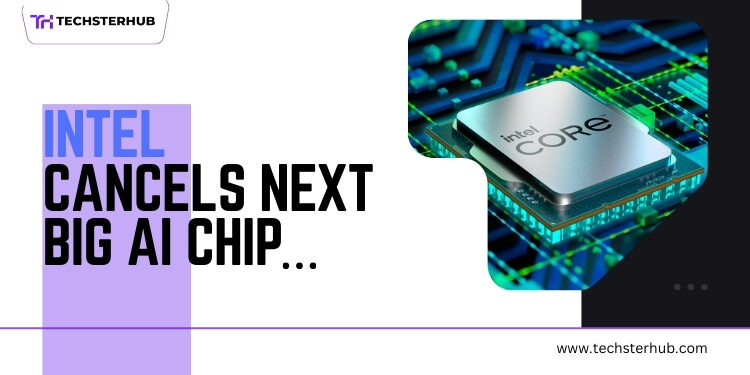As a surprise to many Intel has scrapped its upcoming major AI chip which was anticipated to be fundamental to its AI and machine learning aspirations. The tech giant is currently adjusting its business strategy to maintain competitiveness in the rapidly changing semiconductor and AI sectors when this news out.
The tech sector is reacting with surprise because AI chips stand as critical components for developing machine learning, data processing capabilities and autonomous systems. This explains why the decision was made and includes Pat Gelsinger’s remarks as Intel’s interim co-CEO.
Intel has decided to cancel development of its upcoming major AI chip.
Intel worked on a chip that was specifically created to speed up AI workloads through deep learning and various complex AI applications. The new chip development was supposed to help Intel compete with leading AI chip manufacturers like NVIDIA and AMD who dominate the market with products including NVIDIA’s A100 Tensor Core and AMD’s machine learning-specific chips.
Intel’s choice to stop developing this AI chip indicates they are changing their strategic direction. Intel canceled the chip development because it faced internal problems combined with external market forces.
- Technical and Design Challenges: The creation of advanced AI chips involves significant technical difficulties which Intel encountered during their design process failing to achieve competitor-level performance even with substantial R&D investments ultimately leading to their decision to stop the project.
- Market Competition: The AI chip market is dominated by established companies like NVIDIA who already led the field and Intel understood that catching up was near impossible given its technological challenges.
- Shifting Focus to Other AI Technologies: Intel has redirected its strategy from a standalone AI chip development to focus on other AI technologies and strategies. The company may be looking at ways to enhance its current hardware products like Xeon processors to support AI applications more effectively or to pursue partnerships and acquisitions that would strengthen its AI technological capabilities.
What Did Intel’s Interim Co-CEO Pat Gelsinger Say?
Pat Gelsinger who serves as Intel’s interim co-CEO discussed the AI chip cancellation during a recent interview and explained how it fits into Intel’s strategic plans. Here’s a summary of what he had to say:
- Emphasizing Strategic Alignment:
According to Gelsigner the chip cancellation was a component of Intel’s comprehensive strategic realignment. Intel must concentrate on selecting appropriate technologies to produce products that match its long-term vision according to Pat Gelsinger. Intel intends to concentrate on specific sectors where it can deliver maximum customer value and keep its competitive edge instead of chasing every emerging trend.
Gelsinger explained they’re redirecting their AI strategy to concentrate on market-leading areas that offer substantial value.
- Shifting Focus on AI Software and Infrastructure:
According to Gelsinger, even though Intel cancelled their AI chip project they remain committed to AI development. The company now intends to redirect its focus towards AI software development and infrastructure projects. Intel is dedicated to improving AI workflows with optimized software solutions and AI-powered infrastructure that functions across diverse industries and applications. Intel plans to partner with other companies while utilizing its existing expertise in data centers and cloud computing.
- Adapting to Market Realities:
Intel’s move demonstrates a larger adjustment according to market conditions as explained by the interim CEO. Intel has been leading in semiconductors but the fast-paced evolution of the AI market requires Intel to change its strategy to maintain leadership. Intel will thrive by developing cutting-edge technologies even if this requires making tough choices such as discontinuing specific projects.
- Focus on Core Strengths:
Gelsinger believes that Intel will continue to grow by building on its powerful processors and deep industry relationships. Intel should use its data processing and hardware acceleration strengths to create complementary solutions for the AI ecosystem instead of trying to directly compete with established AI chipmakers.
- Commitment to AI and Data Centers:
Gelsinger told stakeholders that even though the AI chip encountered issues Intel is still dedicated to its AI and data center initiatives. Intel’s Xeon Scalable processors have made substantial progress in the AI sector while plans to widen its high-performance solutions for AI workloads in data centers and cloud environments are underway.
What Does This Mean for Intel’s Future?
The termination of Intel’s latest major AI chip project does not end Intel’s AI ambitions. The situation shows a company that is actively responding to the fast-paced developments in the AI industry. Here are some potential takeaways for Intel’s future:
The decision to cancel Intel’s upcoming major AI chip shows a big step but does not mean Intel plans to abandon its AI objectives. The situation shows a company that is evolving to keep up with fast-paced developments in AI technology. Here are some potential takeaways for Intel’s future:
- A More Focused AI Strategy: Intel plans to direct their AI efforts toward building on their established competencies in data center infrastructure and cloud solutions rather than entering the crowded AI chip market.
- Collaboration and Partnerships: Intel may create partnerships with superior AI chip manufacturers to build a cooperative network rather than developing all components internally.
- Continued Investment in Data Center AI Solutions: Intel’s strategic move to realign towards data center solutions could lead to increased emphasis on AI technologies for data centers which require more processing power for AI tasks and Intel’s Xeon and Optane products may establish themselves as crucial components in enterprise AI infrastructure.
Conclusion
Although Intel’s cancellation of its upcoming major AI chip might seem unexpected Intel has shifted its strategy to focus on domains where the company can maximize its core competencies. The company chooses to exit the AI chip competition but continues to back AI development with its data center offerings and alliance-building efforts.
Pat Gelsinger’s statements as interim co-CEO reveals Intel’s strategy to remain influential in AI and tech sectors despite choosing not to directly challenge NVIDIA in AI chip manufacturing. Intel seeks to maintain its presence in artificial intelligence by concentrating on its core strengths while modifying its AI strategy.











